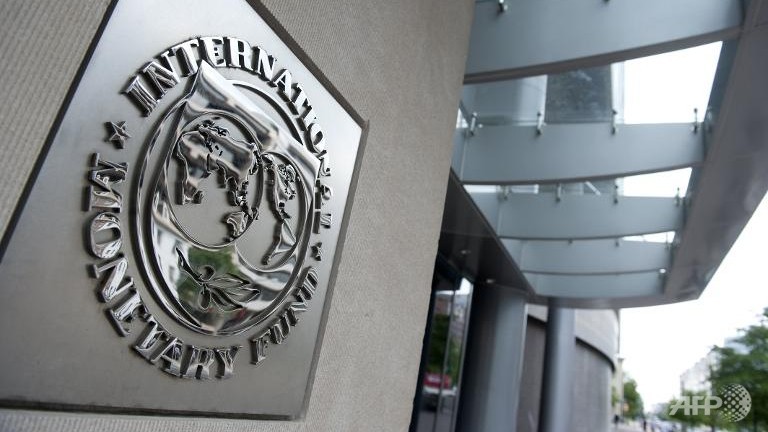G20 urges US to ratify IMF reforms by year-end

The logo of the International Monetary Fund (IMF) at the organisation's headquarters in Washington, DC. (AFP/Saul Loeb)
WASHINGTON: The G20 pressed the United States on Friday to ratify crucial International Monetary Fund (IMF) reforms after four years of waiting, suggesting they would find an alternative if Washington does not deliver by year-end.
"We are deeply disappointed with the continued delay in progressing the IMF quota and governance reforms" agreed in 2010, the group said.
"The implementation of the 2010 reforms remains our highest priority and we urge the US to ratify these reforms at the earliest opportunity," the group said.
The Group of 20 economic powers, which includes the United States, said it would ask the International Monetary Fund to develop an alternative plan "if the 2010 reforms are not ratified by year-end."
The reforms, which include a funding increase and expansion of emerging economies' roles in the IMF, were originally strongly backed by the United States, the Fund's largest shareholder.
But implementation, which must have US support, has been held up by political battles in the US Congress, which needs to ratify the reforms.
Senators from President Barack Obama's Democratic Party tried to push through reforms by attaching them last month to an aid bill for Ukraine, but backed down faced with opposition from the rival Republican Party.
Conservative Republicans have charged that the IMF reforms increase the US contribution while weakening its role.
Japanese Finance Minister Taro Aso said that the IMF should decide on whether to seek an alternative after looking at the results of US congressional elections in November.
"Maybe we have to see the election results and what the position of the US is. If ratification is denied, the IMF will have to think about what should be done. So they can go back maybe to think about an alternative reform plan if it's required," Aso told reporters.
Aso said that Japan - the second largest shareholder in the IMF after the United States - had accepted the 2010 reforms even though its share would be slightly diluted.
Wolfgang Schaeuble, finance minister of Germany, another IMF power, said US ratification would "strengthen the fund's legitimacy as well as its capacity to act."
"As a token of their goodwill, the US should finally ratify the IMF reforms to give the rising powers of the 21st century a say in the Fund's affairs."
Under the proposed reforms, the US quota share in the IMF would slip slightly from 17.69 per cent to 17.40 per cent, still enough to give the United States veto power. China - the world's second largest economy - would become the Fund's second shareholder.
The reforms also double the amount of money the IMF has to lend, an action necessary after the crisis that began in 2008 ravaged the US and European economies.
Congress would not need to approve any new spending immediately as part of IMF reforms as money would be shifted from an emergency fund that is winding down.
Asked whether the IMF was preparing a "Plan B", Singapore Finance Minister Tharman Shanmugaratnam, Chairman of the IMF's steering committee, said the Fund was focused on allowing the US to move by year-end.
"Any other options will be discussed only if the 2010 reforms are not put into place by the end of this year."
Few expect US lawmakers to do that before November's mid-term congressional elections. But that would leave several weeks for the outgoing Congress to sign off on the reforms by December 31.
What the stars mean:
★ Poor ★ ★ Promising ★★★ Good ★★★★ Very good ★★★★★ Exceptional
Latest News
More News
- Russian President congratulates Vietnamese Party leader during phone talks (January 25, 2026 | 09:58)
- Worldwide congratulations underscore confidence in Vietnam’s 14th Party Congress (January 23, 2026 | 09:02)
- Political parties, organisations, int’l friends send congratulations to 14th National Party Congress (January 22, 2026 | 09:33)
- 14th National Party Congress: Japanese media highlight Vietnam’s growth targets (January 21, 2026 | 09:46)
- 14th National Party Congress: Driving force for Vietnam to continue renewal, innovation, breakthroughs (January 21, 2026 | 09:42)
- Vietnam remains spiritual support for progressive forces: Colombian party leader (January 21, 2026 | 08:00)
- Int'l media provides large coverage of 14th National Party Congress's first working day (January 20, 2026 | 09:09)
- Vietnamese firms win top honours at ASEAN Digital Awards (January 16, 2026 | 16:45)
- ASEAN Digital Ministers' Meeting opens in Hanoi (January 15, 2026 | 15:33)
- ASEAN economies move up the global chip value chain (December 09, 2025 | 13:32)
















 Mobile Version
Mobile Version